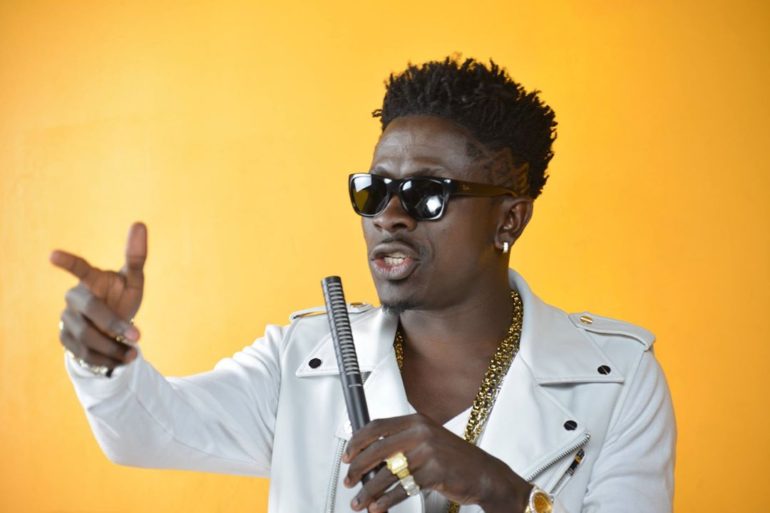
Last night, Shatta Wale launched an unfortunate assault on Ghanaian music producer-Mark Okraku Mantey—and I say “unfortunate” because I find some of the words used inappropriate, albeit his assault was justifiable.
Shatta Wale in the over 30 minutes Facebook Live broadcast which he titled ‘Real Talk’ went after Mark Okraku Mantey for the latter’s comment in an interview with Bola Ray—that Shatta Wale’s kind of music is not dancehall, implying that it was, therefore, absurd that Shatta even calls himself the King of dancehall.
The above comment by Mark Okraku Mantey may seem harmless but anyone who has a perfect understanding of the music business would appreciate what such brand attack and ego assault can do to a musician.
What Mark said in simple words was that Shatta Wale is not a competent Dancehall artiste and even proceeded to pick an industry rival-Jupita over him–saying Jupita was authentic and Wale was fake.
The truth is, Mark Okraku Mantey is no different to the many radio commentators in Ghana, who have no real expertise in fields they comment on—no proper education or close association with the products they seek to scrutinise.
Mark has never been to a Law School, but like the others, he comments on Law and does so with some smug sense of authority. And he does the same with everything else…
Of course, Okraku has over a decade music production experience but most of his gigs have been Highlife or Hiplife related—therefore, when did he become a Dancehall expert? Where did he get the expertise to determine what music is a dancehall music and what’s not?
Any educated person would easily understand that art including music is not lucid, due to the individual style or unique contribution to the bigger discourse. Music, like most other things, is dynamic—and this can easily be ascertained by looking at the different forms of Hip Hop or the scattered particles of even Hiplife we have today.
Robert Nesta Marley is widely accepted as an international Reggae superstar and yet there were critics who said Bob’s style of music was not truly reggae in those days. There’s something call evolution of music which Mark Okraku Mantey seems to have no idea about.
Music is a living spirit and its evolution as we’ve witnessed comes about through the creative brilliance of artists who take the challenge to twist things and inject their personal touch to the different genres out there.

Traditional Reggae is not the sort of reggae many of our generational artists are churning out—even the message has changed, let alone the style or beat.
Dub poet Mutabaruka once said, “if 1970s reggae was red, green and gold, then in the next decade it was gold chains”. Dancehall has been “far removed from reggae’s gentle roots and culture, and there was much debate among purists [in its early days] as to whether it should be considered an extension of reggae.”
Ideologically, just like reggae, dancehall gained global prominence on the back of the social inequality and widespread Jamaican injustice it sought to challenge—as well as the Jamaican cultural exposure.
Therefore, an artist doing dancehall in Ghana even in the 1970’s without similar societal challenges wouldn’t be doing the same sort of Jamaican dancehall—as far as the message was concerned. And if artists are allowed to be creative, then after injecting personal creativity, the output shouldn’t be expected to be the same.
The genre which we consider dancehall today has never been well defined—Dancehall was actually named after Jamaican dance halls in which popular Jamaican recordings were played by local sound systems in the 1940s.
So it was some popular Jamaican songs, played with specific sound systems in popular dance halls and carrying the theme messages of the time (being social injustice, repatriation and the Rastafari movement, violence and sexuality) that were loosely called dancehall-Barrow, Steve & Dalton, Peter noted in their 2004 published book “The Rough Guide to Reggae.”
Dancehall is not determined by a single factor—several ingredients come together to make what we accept as dancehall, just as several ingredients come together to make up a soup. If the absence of salt or pepper does not suddenly make something that ought to be a soup, not a soup—why must a missing element of something that ought to be dancehall even if it has the others, make it not a dancehall in the face of individual creativity?
And even if dancehall was rigidly defined (which it’s not), Mark Okraku Mantey should spare us the nonsense—he wouldn’t be the one to determine what fits in the box. He has no educational authority or work experience in that field to mount reasonable arguments in support of his “determination assertions”.
Watch Shatta Wale’s Real Talk below…

